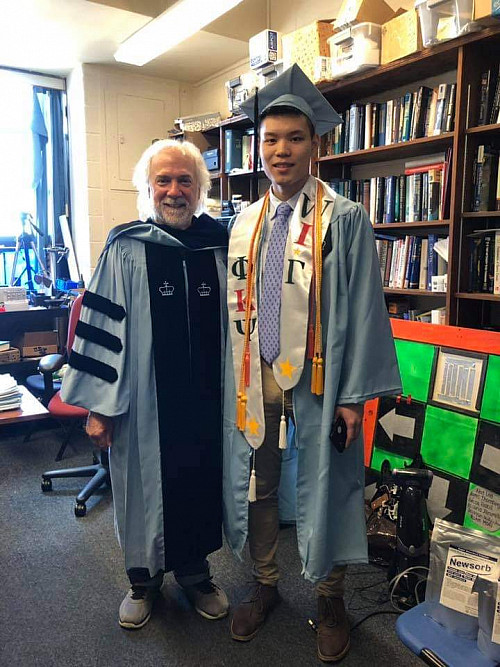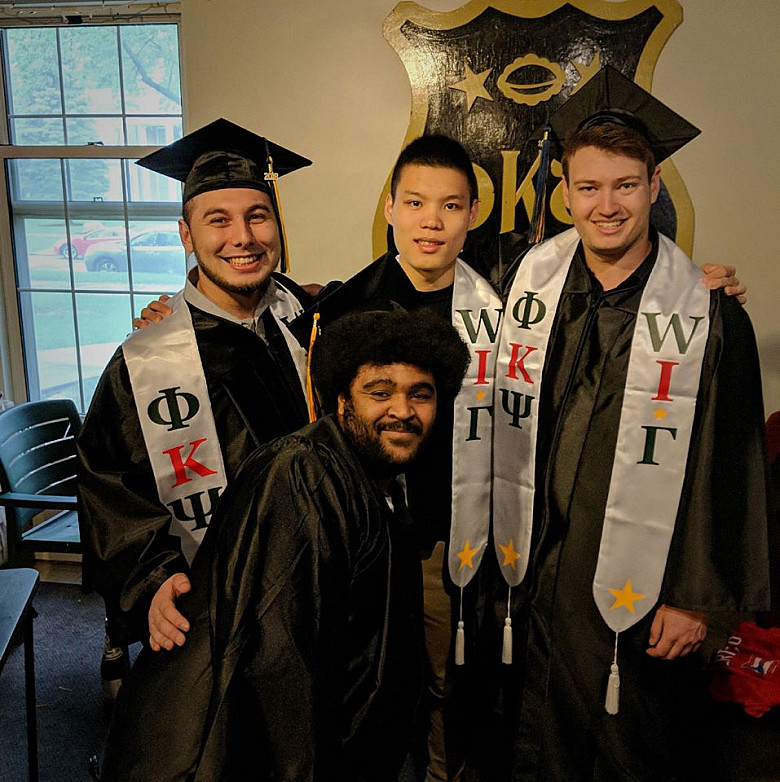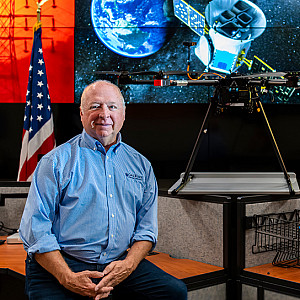Slowing Down to Learn, Explore, and Engage on the Way to Becoming an Engineer
As a high school early leaver, at Beloit College, design engineer Johnny Li’20 found an environment that nurtured him personally and academically by allowing him to take courses in a variety of fields and establish strong connections with both fellow students and faculty members.
Beloit College physics graduate Johnny (Chiahao) Li’20 left high school in the 11th grade. A dedicated learner, he’d taken on-line courses in addition to his high school courses, and wanted the opportunities and challenges that higher education could offer.
But he was also young. Attending a large, research university made sense for his interest in becoming an engineer. However, a small college better might ease the adjustment from high school to higher education. Plus, he wanted an institution where he could study more than one subject.
“I knew that I wanted to study engineering. But engineering schools require a laser-like focus. I didn’t want that; I had too many other interests. So when it came down to a decision, Beloit College felt right. It was small and had a 3-2 engineering program.”
Johnny had also been prescient in anticipating a transition from high school to college. Worried that he might not be prepared mentally and academically, he initially felt isolated after arriving at Beloit. But the college’s small size made it easy to get involved in clubs, pledge to a fraternity, and join the swim team.
“As soon as I began getting involved in extracurricular activities, I began to feel I was part of a community. I didn’t intend to do anything more than swim recreationally. But when the coach saw me in the pool one day, he invited me to try out.”
Joining the team paid off. “Being a member of a team requires perseverance, mental fortitude, and scheduling in order to balance academics with your other activities.”
Those skills helped with Johnny’s transition to Columbia University for the second part of Beloit’s three-two engineering program. “Columbia is a much bigger institution than Beloit, but having learned the value of having community, a social circle, a safety net, and good mental health while at Beloit, I looked for ways to have those at Columbia.”
The interpersonal skills he developed at Beloit and his liberal arts studies helped. At Beloit, he’d benefited from knowing people from all sorts of backgrounds and interests. And the curriculum had been instrumental in allowing him to expand his interests.
“A lot of engineering students only know engineering, and approach general education requirements as something to get out of the way. A Columbia four-year engineering student told me she thought that the 3-2 students were different. They were friendlier and had more interests. I guess that was true. For example, I’d taken a theater design course at Beloit. That made it easy for me to talk with a student outside my program who was interested in that.”

“Beloit’s small classes made it easy to get know your professors. They were willing to interrupt lectures to answer questions, and office hours made it easy to approach them. They also wanted to get to know you personally, by doing things such as inviting students over for barbecues in their backyards. Beloit faculty provide a safety net. They don’t want students to fail.”
The situation at Columbia was very different, where engineering lecture halls easily hold 100 or more students. That makes it easy to slip under the radar and not stand out. But he knew from his time at Beloit that it was important to get to know the faculty who were teaching him.
“I decided to strike up conversations with faculty in the elevators on the Columbia campus, and to seek them out during their office hours. As I result, I got to know about opportunities to assist with research and in labs, become a teaching assistant, and apply for summer internships. As these weren’t openly advertised, the only way to find out about them was from a faculty member who knew you.”
Johnny currently works as a R&D engineer at the Taiwanese semiconductor manufacturing company TMSC, where he analyses data, performs circuit simulations and examines standard cell topologies in order to create the best standard cells for customers. His original plan, however, had been to work in the U.S. after completing his BS and MS degrees in electrical engineering at Columbia.
“I applied for job openings, only to see them withdrawn when the pandemic worsened. And as my immigration status didn’t allow me to remain in the U.S. without a job offer, I decided to retreat home to Taiwan. Taiwan was also safer from the pandemic at that time and its semiconductor sector is robust.
The decision proved wise. “Joining TMSC has allowed me to dip my toes into the semiconductor industry. All of my previous applied experience was within academia. The industry environment differs from academic more than I had expected, but I’m getting a good sense of how the process works now.” That knowledge will serve him well should he want to move to another company, whether in Taiwan or abroad.
Asked about his advice for current and future Beloit College student, Johnny’s recommendation is straightforward. “Crave more.” He goes on to expound: His three years at Beloit allowed him to slow down after middle school and high school.
“Beloit College gave me the time and space to explore other subjects, such as philosophy, economics, and math. I even considered majoring in economics or focusing on astronomy.” He recommends that current and future Beloit students take the same approach.
“Take the time to explore what you do well and what you are interested in. Also, be aware that after you graduate, it won’t be the knowledge you acquired at college that will take you forward, but the soft skills of flexibility, communication, being open-minded, and listening to others’ views.”
He’s found the soft skills to be critical. “In the real world, you have to work with people whose views are different from yours. That requires that you are well-rounded. And don’t get stuck in your own world. The world is changing fast. To keep up you need a flexible mind, a good understanding of different things, and the desire to keep learning new things. If you can’t keep up with the changing world, you’ll be left out.”



